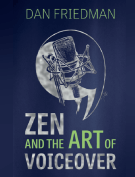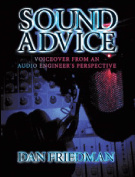 People new to voiceover are always asking me about effects stacks. For those of you who don’t know what effects stacks (or effects processors) do, or for those who don’t know what I’m even talking about, you are in luck. This article will help explain a couple of the most commonly used effects processors and will also help you steer clear of some things you probably should avoid… for now.
People new to voiceover are always asking me about effects stacks. For those of you who don’t know what effects stacks (or effects processors) do, or for those who don’t know what I’m even talking about, you are in luck. This article will help explain a couple of the most commonly used effects processors and will also help you steer clear of some things you probably should avoid… for now.
Compression and Equalization… What they do.
Audio effects processors including compressors and EQ (or equalizers) are very important elements in audio production. Compression is used to control dynamics, or the loud and soft parts of a recording. A compressor controls dynamics by lowering the output level of louder parts and raising the level of softer parts. This produces overall output levels that are more evenly balanced throughout the compressed portion of audio.
An equalizer is used to adjust the tones, or frequencies, within a sound. EQ can be used in several ways to enhance or alter certain tones by increasing or decreasing the level of specific frequencies to create an overall sound that is more pleasant. EQ can also be used to create an effected sound, such as simulating the sound of a telephone.
This is all very cool! However, if you are just getting started in voiceover, (and most of the time, even if you’ve been doing this for awhile) these effects are not really something you need to be overly concerned with… at least, not in the beginning.
What should you do?
Should you attempt to learn a little something about them as you are learning your craft? Yes.
Should you be running all of your voice recordings through rack or outboard processors as you are recording? Definitely not.
Should you be inserting DAW effects, effects stacks or presets on every voiceover recording you produce? No.
As you are working on developing your voiceover career, your number one focus should always be on your delivery.
The Magic is in Your Delivery.
When used properly or creatively, processing can make a good recording sound great. But a weak performance, will always sound like a weak performance no matter how much or how little processing is used. It is very easy for people to get caught up in the magic and mystery of the tools, rather than focusing on where the magic truly lies… in the delivery. Simply stated, compression and EQ will not turn a weak delivery into a magical one.
Speaking of deliveries, different scripts require different interpretations, enthusiasm, loudness and energy levels. How loud or soft certain elements are in your delivery are not the same for every script. Therefore, you cannot simply go to the same presets for every script you read and “set it and forget it”. One size, does not fit all.
Creativity or Correction? What Would Be More Fun For You?
Also, as a new voice talent, it is rare that you will be called upon to do a full production. Most often you will be sending your audio elsewhere, where it will be edited, manipulated and mixed alongside music, sound effects or other voices. The mix engineer cannot undo this type of processing. If you were to add processing incorrectly or inappropriately, you may have created a very frustrating situation that could make a mix engineer very unhappy. A new unprocessed recording could be the only solution to the problem and there are no guarantees that the client will come back to you to get it.
Generally, compression and equalization are used in two ways; creatively or correctively. If you’ve chosen your equipment well, have a finely tuned acoustic environment and are always working on your technique, these processing tools can be used creatively as opposed to correctively. Rather than using these processors in an attempt to fix difficult acoustic or technical problems, the tools can be used to place your voice properly in a mix or to enable you to sound like you… only better! As you can imagine, creative, is far more enjoyable for the mix engineer.
As you pursue your career as a voice talent, it will be helpful to learn and understand all elements involved in audio production. However, have patience and focus on what is important for you at this moment in time. Above all, remember that no matter what level you are at in your career, the most important effect to the voiceover talent… is the effect your delivery has on the listener.
You’ll find more on compression and equalization in Sound Advice – Voiceover From an Audio Engineer’s Perspective.
 The
The  Your advertising dollars and your time are important to you. Do you know how to get the most from your voiceover session? Here are my 10 Tips For Getting the Most From Your Voiceover Session.
Your advertising dollars and your time are important to you. Do you know how to get the most from your voiceover session? Here are my 10 Tips For Getting the Most From Your Voiceover Session. I live in what I think (and many will agree) is one of the most beautiful parts of the USA. However, all that lush forest and beautiful foliage brings with it pollen, allergens, and air so thick you can watch it as it blows by. For most people, allergy season is merely a nuisance. For
I live in what I think (and many will agree) is one of the most beautiful parts of the USA. However, all that lush forest and beautiful foliage brings with it pollen, allergens, and air so thick you can watch it as it blows by. For most people, allergy season is merely a nuisance. For 


